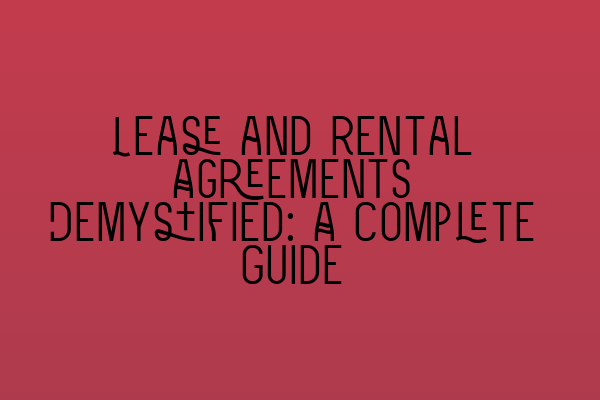Lease and Rental Agreements Demystified: A Complete Guide
Introduction
Lease and rental agreements are an essential part of the real estate industry, whether you are a landlord or a tenant. Understanding the intricacies of these agreements will help you protect your rights and make informed decisions. In this comprehensive guide, we will demystify lease and rental agreements, covering everything from their definitions to common clauses and important considerations. So, let’s dive in!
Understanding Lease and Rental Agreements
Before we delve into the details, let’s clarify the difference between a lease and a rental agreement. A lease is a legally binding contract that grants a tenant exclusive possession of a property for a specified period, typically for one year or more. On the other hand, a rental agreement covers shorter periods, usually month to month.
Key Elements of Lease and Rental Agreements
A well-drafted lease or rental agreement should include the following key elements:
- Parties: Clearly identify the landlord and tenant involved in the agreement.
- Property: Describe the rented property in detail, including its address and any specific areas or amenities included.
- Term: Specify the duration of the lease or rental agreement, including start and end dates.
- Rent: Clearly state the amount of rent, the due date, and accepted payment methods.
- Security Deposit: Outline the amount of the security deposit and the conditions for its return at the end of the tenancy.
- Restrictions: Mention any restrictions on the use of the property, such as pet policies or smoking regulations.
- Repairs and Maintenance: Define the rights and responsibilities of both parties regarding repairs and maintenance of the property.
- Termination: Include provisions for early termination, renewal, or extension of the lease or rental agreement.
- Dispute Resolution: Specify the procedures for resolving disputes, such as mediation or arbitration.
Common Clauses in Lease and Rental Agreements
Now that we understand the key elements, let’s explore some common clauses you may encounter in lease and rental agreements:
- Force Majeure: This clause protects both parties in the event of unforeseen circumstances, such as natural disasters or government actions, that prevent either party from fulfilling their obligations.
- Utilities: Clearly state which party is responsible for paying utilities, such as electricity, water, or internet.
- Repairs: Define the procedures for reporting and addressing maintenance issues, including who is responsible for the costs.
- Access: Specify the circumstances under which the landlord can enter the rented property, ensuring the tenant’s privacy rights are respected.
- Subleasing: Address whether subleasing is allowed, and if so, the conditions and requirements for subletting the property.
- Insurance: Determine who is responsible for obtaining and maintaining insurance coverage for the property.
- Renewal: Outline the procedures for renewing the lease or rental agreement, including any changes in terms or rent.
Important Considerations
As you navigate lease and rental agreements, keep the following considerations in mind:
- Legal Advice: It is always recommended to seek legal advice before signing any lease or rental agreement, as each situation is unique and may require specific provisions or modifications.
- Documentation: Keep a copy of the signed lease or rental agreement in a safe place for future reference or potential conflicts.
- Understanding Local Laws: Familiarize yourself with local laws and regulations governing lease and rental agreements to ensure compliance and protect your rights.
- Open Communication: Establish open communication with the other party to address any concerns or issues that may arise during the tenancy.
Conclusion
Lease and rental agreements can often seem complex, but with a comprehensive understanding of their elements, common clauses, and important considerations, you can confidently navigate the world of real estate. Remember to consult legal professionals for tailored advice, and stay informed about the latest regulations in your area. By doing so, you can protect your rights and ensure a smooth and successful tenancy. If you have any further questions or require assistance, do not hesitate to reach out to SQE Contract Law for expert guidance.
